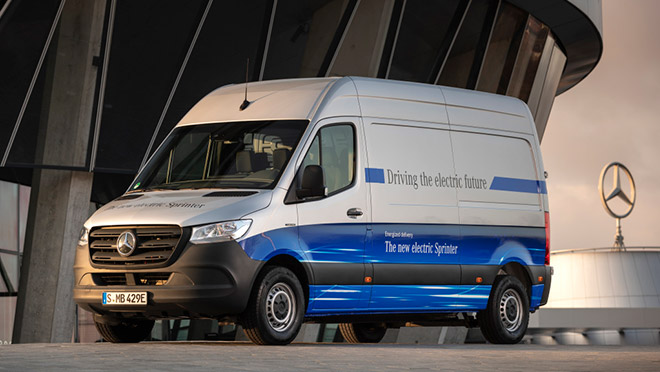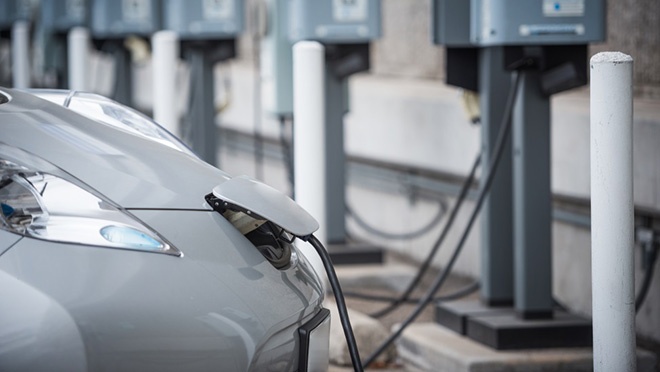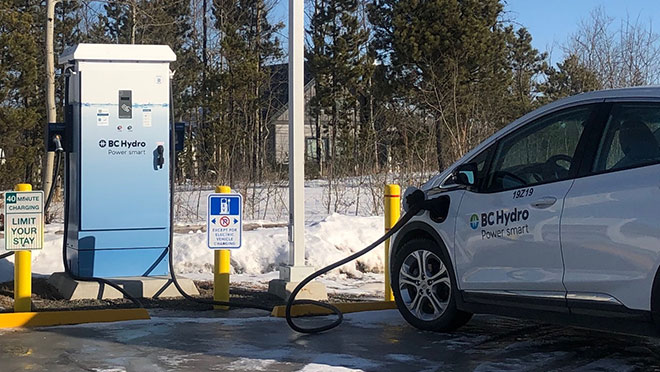Businesses warming to idea of electric fleets

Few and far between now, fleets will grow with rebates and new vehicle options
The rebates are in place and fleet examples are out there, but until the right vehicles are available at the right price, don't expect many businesses to fully plug in to the idea of electric vehicle fleets.
That's the message of Patrick Breuer, who is both a huge proponent of EV fleets and a pragmatist who knows the fit isn't right for many businesses. At least not yet.
"Today, the biggest challenge is getting the vehicles they want," says Breuer, the electric vehicles advisor for Plugin BC. "Maybe you want trucks and vans, and while they're available, you can't get them at a reasonable price or with a reasonable range that works for you."
And while some key electric options, such as the Mercedes-Benz eSprinter cargo van and Ford's first all-electric F-150 pickup, could be available in Canada as early as 2022, initial supply will be an issue. So it could be a few years before many businesses who need such vehicle options can convert their fleets to zero-emission vehicles.
Despite the shortage of options and the lag between demand and supply, B.C. businesses such as the courier company Novex Delivery Solutions have found low- and zero-emission vehicles that work for them. So Plugin BC, an offshoot of the Fraser Basin Council, is administering Province of BC rebates to help make it easier for businesses to transition to zero-emission vehicles.
The CleanBC Go Electric Fleets program provides training, advisory services, and financial support. Technical and financial assistance includes:
- Up to 40 hours of ZEV fleet advisor services
- Up to $10,000 in rebates for telematics tools and a ZEV fleet assessment
- Up to $5,000 in rebates for facility planning assessments
- For a limited time, up to $30,000 in rebates for electrical infrastructure upgrades to support fleet EV charging (otherwise a maximum of $20,000)
- For a limited time, up to $4,000 in rebates for the purchase and installation of Level 2 charging stations (otherwise a maximum of $2,000)
- Up to $50,000 in rebates for the purchase and installation of Fast chargers;
- Training sessions and webinars
- Resources and tools via the West Coast Electric Fleets Toolkit.
That's a nice package, especially with the beefed-up limited time charging infrastructure rebates in the mix. So it will be tempting for businesses eager to add another layer of sustainability to the way they do business.
So far, PluginBC's Breuer reports that there has been more interest than actual applications for various aspects of the Go Electric Fleets program. But he expects that will change as government-affiliated operations, in particular, get the thumbs-up to pursue fleet electrification.
"People are definitely interested, but in many cases, they'll need to jump through a bunch of hoops before they move forward," he says. "So for now, there's definitely a lag. I expect a wave of applications to come through pretty soon."
As an Alliance member, know the program and the tech options
Infrastructure work for fleet development in B.C. has tremendous potential, so it's a good idea to get familiar with the Go Electric Fleets rebates, processes and offerings.
Breuer also suggests getting up to speed on the pros and cons of going with proprietary charging systems over open-standard systems. He likens the choice to the "walled garden" option in the computing/internet world, where a carrier or service provider has control over applications, content, and/or media, but restricts convenient access to non-approved applications or content.
"You may recommend your clients go with a proprietary system, but it may not always be the best thing for the client," he says. "I'd encourage contractors to get to know the differences so that they can advise clients on the right charging stations for their needs."
Consult BC Hydro about load impacts of charging infrastructure
BC Hydro's Jason Scultety acts as key account manager for fleet electrification. And as is the case with customers interested in fleets, he encourages Alliance members to contact him early in the process to gauge impacts fleet charging might have on the local grid.
"Just come talk to us right away and speak with us early and often," says Scultety. "We offer what we call pre-assessment service, so we can look at a specific area of the grid related to your facility. Give us an understanding of what charging loads you're looking at, and we can verify whether there's sufficient capacity in the surrounding grid before you decide to do an interconnection application or anything like that."
BC Hydro also offers fleet transportation rates to customers to help offset Demand charges associated with fleet charging. There are a number of resources available on the BC Hydro website too, including Fleet Electrification Guidelines and guidelines on the best practices for installing fast chargers and Level 2 chargers.
Commercial Vehicle Pilots program zeroes in on larger electrics
The CleanBC Go Electric Commercial Vehicle Pilots (CVP) Program supports B.C.-based businesses, non-profits and eligible public entities looking to deploy commercial zero-emission vehicles, including medium- and heavy-duty on-road vehicles, rail, marine, aircraft and off-road equipment, along with supporting infrastructure.
Applications seeking support for on-road weight class 3 and 4 must deploy a minimum of six zero-emission vehicles. For weight class 5 and 6, applications must deploy a minimum of three ZEVs. For weight class 7 and 8, and off-road vehicle types, there is no minimum vehicle deployment number.
Two information sessions were held earlier this year, and if you're an Alliance member who missed out, you can view the presentation on the CVP site.
Related:

